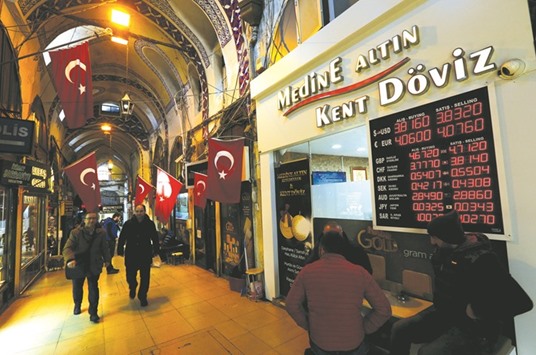Turkey’s central bank raised its overnight lending interest rate yesterday and said it would tighten further if necessary, building on recent extraordinary measures to bolster the lira and contain its impact on inflation.
The Monetary Policy Committee led by Murat Cetinkaya raised the overnight lending rate by 75 basis points to 9.25%, in line with the median estimate in a Bloomberg survey. The one-week repo and overnight borrowing rates were kept unchanged at 8% and 7.25%, compared with predicted increases of 50 basis points and 25 basis points respectively.
With the lira trading at record lows against the dollar, the central bank rolled out a series of unorthodox measures in recent weeks, including using swaps to smooth volatility. Since January 16, it has also forced commercial lenders to borrow via the so-called late-liquidity window, which is more expensive than all of the bank’s key rates. That rate was also raised to 11% from 10% yesterday, the bank said.
“This might give some near-term support to the lira although, I suspect further tightening may be needed to really turn the currency around,” Paul Fage, a strategist at TD Securities in London, said by e-mail.
The lira weakened as much as 1.9% after the announcement before trimming losses to 0.5%, or 3.7740 per dollar, at 3.05pm in Istanbul. It is fallen almost 7% this year, following last year’s 17% plunge.
Even as the lira declined, the central bank faced demands from President Recep Tayyip Erdogan’s officials for lower rates to spur growth in the wake of July’s coup attempt. But those calls softened in recent weeks, with the economy still hurting from terrorist attacks, inflation above target and weakening global demand for riskier assets since Donald Trump’s US election victory putting further pressure on the currency.
“The Committee decided to strengthen the monetary tightening in order to contain the deterioration in the inflation outlook,” the bank said. “If needed, further monetary tightening will be delivered.”
Consumer prices rose an annual 8.5% in 2016, compared with the bank’s 5% target.
The bank’s decision also in effect halts its plan to simplify policy by reducing the gap between the overnight lending and borrowing rates and using the one-week repo rate as the main funding tool.
The gap, which narrowed to one percentage point in September, the narrowest since the bank began using a three- gauge policy in 2010, is now two percentage points. No funding has been issued using the one-week repo rate since the middle of January.
The current “unorthodox” policy gives the bank the tools to protect the lira, according to Odeabank economist Sakir Turan, who forecast no change to any of the gauges.
“With the current rates, the lira may not depreciate as fast as before when it next comes under pressure,” he said.
Others disagreed. Tatha Ghose, senior economist at Commerzbank in London, said the weaker dollar since Trump’s inauguration had more of an impact in stabilising the lira, and that Turkey’s effective rates will need to reach 11% this year to tackle inflation.
“It now depends on what the dollar will do and when pressure will return to the lira,” he said by e-mail.

Merchants chat in front of a currency exchange office at the historical Grand Bazaar, known as the Covered Bazaar, in Istanbul on January 12. With the lira trading at record lows against the dollar, the central bank rolled out a series of unorthodox measures in recent weeks, including using swaps to smooth volatility.
